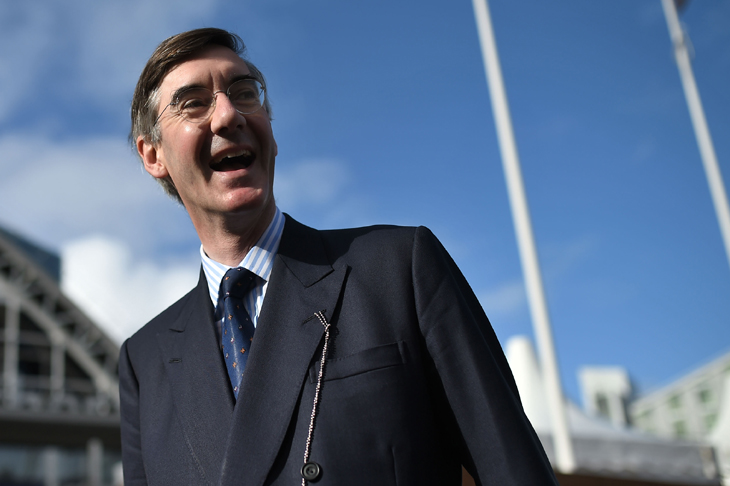‘I don’t think I’m quite as Austrian as you are,’ a Tory minister said to me the other day. And I knew then that the party is doomed. It wasn’t what he said so much as the way that he said it: in the fond, amused, each-to-his-own tone you might use to dismiss a friend’s enthusiasm for Morris dancing or Napoleonic re-enactment or dogging…
But personally, I think free market economics (of the Austrian or any other classical liberal school) is far too important to be left to wonks, think-tankers and out-there right-wing commentators. So did Margaret Thatcher. ‘Hayek’s powerful Road to Serfdom left a permanent mark on my own political character, making me a long-term optimist for free enterprise and liberty,’ she said. And so did Ronald Reagan. Asked which philosophical thinker or writers had influenced his conduct as a leader, he replied: ‘I have read the economic views of von Mises and Hayek.’
Much has been made of the unfortunate fact that we now have a Conservative prime minister who doesn’t feel at all comfortable defending free markets. But the bigger problem is: nor do many of her juniors. I could name one or two exceptions: Jacob Rees-Mogg definitely gets it; so do Steve Baker, Kwasi Kwarteng, John Redwood and, I think, Priti Patel. But it’s not very encouraging. Not when you realise that it’s economics — and only economics — which will ultimately decide whether or not Jeremy Corbyn ever gets to become prime minister.
The reason for this is quite simple: when you have a resurgent opposition promising to make everything better by ending austerity, you need a counter-narrative compelling enough to make people vote for you rather than for the party that’s offering all that free jam. ‘Our free jam is more responsibly sourced’ is not a compelling argument. Nor is: ‘Look at our free-jam track record.’ Nor, for that matter, is: ‘Look at Venezuela. That’s how little jam you get under socialism.’ Nor ‘Here is a new report showing how guilty we are about some made up nonsense about jam injustice among ethnic minorities’. Nor even, I’m sorry to say, is: ‘The government doesn’t have a magic jam-making tree.’
It’s a shame the last argument hasn’t worked, because in essence it’s a very effective one. Rees-Mogg demonstrated this a few weeks back on Question Time, in response to a question about government spending. Patiently he pointed out that the government has no money of its own: only what it takes through taxation or borrows, with negative consequences either for the productive sector of the economy or for the future generations who are left on the hook. The audience got it: they clapped. Ordinary people are more intelligent than politicians give them credit for — but only if you present them with the arguments and the facts, not if you hold back for fear that it might confuse them.
But this government has a major problem with its ‘magic money tree’ defence of Conservatism. It hasn’t lived by this principle for a very long time. Nor does it even understand it, to judge by some of the eye-catching initiatives rolled out at conference this week: the bribes for students; the subsidies for home buyers… The way May’s Conservatives are carrying on, you’d think they imagined they were in possession of a fantastical arboreal structure with the power to generate free cash.
There’s a book just out which everyone in the Conservative party ought to read: Architect of Prosperity by Neil Monnery. It’s the biography of one of the 20th century’s greatest unsung heroes, Sir John Cowperthwaite, the financial secretary in the British colonial administration whose determinedly low-tax, regulation-light, fiscally austere regime put Hong Kong on its path to prosperity.
Between 1960 and 1996, per capita income in Hong Kong rose from about one quarter of that in Britain to a third larger. As the economist Milton Friedman said: ‘It’s easy to state those figures. It is more difficult to realise their significance. Compare Britain, the source of the Industrial Revolution, the economic superpower of the 19th century, with Hong Kong, a spit of land, overpopulated and overcrowded, no resources except for a great harbour. Yet this spit of overcrowded land is able within four decades to provide its people with a level of income one third higher than that enjoyed by the residents of its mother country.’
So how did Cowperthwaite do it? Whenever his name is brandished by classical liberals, I’m disappointed by how often even those of a conservative disposition seek to explain away his achievements by pointing to the singularity of the Hong Kong Chinese character — their work ethic, their entrepreneurial spirit, their tolerance for a stripped-down welfare system which more pampered Britons could never accept.
Nonsense. This is just the ‘politics is the art of the possible’ excuse-making which has got the Conservatives into their current mess. The ‘big difference’, as Friedman went on to note in that speech, was ‘economic policy’.
And it wasn’t an economic policy that presented itself on a plate, just because Hong Kong is different. Every detail was argued, fought for, and hard won against the voices of those in the colonial administration, the Hong Kong business community and, especially, in Harold Wilson’s socialist Britain, who either considered the tax rate (initially 12.5 per cent; grudgingly increased under Cowperthwaite to a whopping 15 per cent) too low or government spending on infrastructure, housing and education inadequate.
Cowperthwaite, a classically trained economist, stuck to his guns. The Hong Kong economic miracle was only a ‘miracle’ if you believe economies grow and people prosper through magic. But actually it’s much more basic than that. There’s a simple formula — low tax, light regulation, spending within your means — which works in theory and works in practice. What a pity that the Conservatives have such difficulty understanding it.
Got something to add? Join the discussion and comment below.
Get 10 issues for just $10
Subscribe to The Spectator Australia today for the next 10 magazine issues, plus full online access, for just $10.
You might disagree with half of it, but you’ll enjoy reading all of it. Try your first month for free, then just $2 a week for the remainder of your first year.















Comments
Don't miss out
Join the conversation with other Spectator Australia readers. Subscribe to leave a comment.
SUBSCRIBEAlready a subscriber? Log in